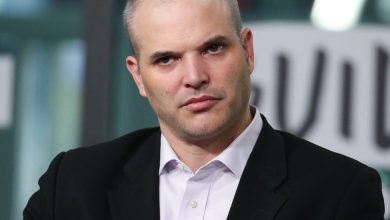An Activist Investor Goes Quiet


Bill Ackman wrote that he had “permanently retired” from the most aggressive form of activist investing.Credit…Drew Angerer for The New York Times
A kinder, gentler activism?
For much of its 19-year history, Bill Ackman’s Pershing Square Capital Management was known as one of the most pugnacious activist investors, willing to wage noisy public battles against companies like J.C. Penney, Procter & Gamble and Target to force changes in their strategies. In his latest letter to investors, however, Ackman wrote that he was ditching this approach for good.
Ackman has “permanently retired” from activist short-selling, which he described as the “noisiest form of activism.” He noted that he hadn’t run these sorts of campaigns often; his most famous such battle was against the nutritional food supplement company Herbalife, a long-running contest that he lost. His shift in strategy also comes as short sellers — bugbears long criticized by corporate boards — face increasing scrutiny from regulators, which some say is unfair.
In general, Pershing Square has been operating more quietly and cooperatively, Ackman says.In his letter, he calls this a new iteration of the hedge fund, which has sought in recent years to work behind the scenes with companies it is seeking to shake up. (The word “constructive” appears seven times in the section of his investor letter describing this change.) Pershing has also taken bets in companies it believes will perform well, like Chipotle, as well as macroeconomic bets that have paid off spectacularly.
This “makes our job easier and more fun, and our quality of life better,” Ackman says of a lower-profile approach. It has also been good for performance: The fund has beaten the S&P 500 in three of the past five years, and it’s running ahead of the index this year.
Ackman is not the only veteran activist investor changing tack. Carl Icahn, his former nemesis on Herbalife, is expanding his campaign to improve companies’ treatment of animals, a departure from his usual playbook of pushing for buybacks, asset sales and other financial maneuvers. Icahn has submitted a plan to nominate two candidates to Kroger’s board, criticizing the supermarket chain for its treatment of pigs, after recently starting a proxy fight at McDonald’s over the same issue.
HERE’S WHAT’S HAPPENING
The S.E.C. weighs new requirements for SPACs. At an open meeting today, the commission is expected to consider new rules for both special purpose acquisition companies and shell companies that could bring them more in line with traditional I.P.O.s. (Here’s one suggestion for how the S.E.C. could adjust its approach to the contentious issue of SPAC disclosure practices.)
The F.D.A. approves a second Covid booster for Americans 50 and older. The additional shot of the Pfizer-BioNTech or Moderna vaccine, at least four months after a first booster, could help address waning immunity, the agency said.
Americans are really worried about inflation. In fact, according to a new Gallup poll, more people consider rising prices the country’s worst problem than at any point since the 1980s. That’s a potential problem for Democrats and the White House as midterm elections loom.
Activision Blizzard settles a federal sexual harassment lawsuit. The video game maker will pay $18 million to resolve claims by the U.S. Equal Employment Opportunity Commission that it did little to address a hostile workplace environment for women for years. Activision still faces lawsuits from former employees, a California regulator and shareholders.
Robinhood will offer extended-hours trading. Shares in the trading app jumped after it announced plans to let customers trade stocks from 7 a.m. to 8 p.m. Eastern, several hours before and after markets are officially open. That matches competitors like Fidelity and is meant to help lift the struggling app’s fortunes.
Exclusive: Stifel’s equity payday
The investment bank Stifel Financial Corp is giving $5,000 each in stock grants to 4,200 of its employees not currently paid via equity, DealBook is first to report. Banks usually offer only their highest earners stock awards. “We want to give everyone ownership,” Ronald Kruszewski, Stifel’s C.E.O., told DealBook.
The move comes amid a war for talent in the finance industry that has led banks to offer employees everything from huge bonuses to free Pelotons. The challenge of retention extends beyond bankers: U.S. job openings remained near record levels last month, according to new data, and the number of workers voluntarily leaving their jobs increased.
Kruszewski said that Stifel’s new policy was about company culture, not the “great resignation.” But he acknowledged the “side benefit” that workers want to stay if you treat them well consistently — “you’ve got to do that all the time,” he said. Other financial firms have also recently expanded stock awards for lower-ranking workers, like the private equity firm KKR as part of its acquisition of Ingersoll Rand.
Stifel’s program covers about half of its employees, and includes administrative, I.T. and client services workers in roughly 500 offices around the world. The shares will vest in five years and will be additive to pay — not included as part of it. The grants will be dispersed evenly, whether “you make 40 grand or make 100 grand,” Kruszewski said.
With the new plan, “substantially” all of Stifel’s 8,600 employees will participate in the firm’s equity program, he said. (For his part, Kruszewski’s compensation in 2020 ran to about $10.7 million, including $3 million in stock awards, according to the company’s latest proxy statement. The median Stifel employee made $102,000 that year.)
The bank has been riding favorable financial conditions, including record deal volumes in recent quarters. Stifel’s shares have nearly doubled since March 2020, outperforming the S&P 500 and many bigger banks, and the firm announced a doubling of its dividend this year. But Kruszewski is aware of rising financial tensions confronting workers, most notably “the inflation pressures that really manifested themselves this year,” he said. The company has also increased guaranteed salary as a share of pay packages so that employees are not as reliant on bonuses at the end of the year.
“Usually, content moderation policy is intended to limit violent content. But war is an exercise in violence. There is no way to sanitize war or to pretend that it is anything different.”
— Emerson Brooking, a senior fellow at the Atlantic Council who studies online disinformation, on the difficult decisions facing Meta, the parent of Facebook and Instagram, in dealing with content about the war in Ukraine.
What is the yield curve trying to say?
Yesterday, a big thing happened in the bond market. The yield on the two-year government note briefly traded higher than the yield on the 10-year government bond, prompting what’s known as a “yield curve inversion.” This is relatively rare and often precedes recessions, which is why it is closely watched.
So is the bond market signaling that we are headed for a recession? Not necessarily. Another part of the yield curve, the spread from three-month to 10-year yields, has been getting steeper, not flatter. “There has never been such a directional divergence” in these segments of the curve, said Deutsche Bank’s Jim Reid, sharing a version of the chart above, which in recent days has been making the rounds in financial circles.
As for the yield curve’s predictive powers, this divergence could be a sign that “something genuinely is different this time,” according to Bloomberg Opinion’s John Authers. It could still be an indication of a recession, or it may just be market weirdness at a time when the Fed is trying to unwind the “mountain” of stimulus it enacted during the pandemic.
Held to account
Federal white-collar crime prosecutions fell to their lowest level in 20 years during the Trump administration, and the Biden administration has pledged to crack down. “Corporate crime weakens our economic institutions by undermining public trust in the fairness of those institutions,” Attorney General Merrick Garland said this month in a speech to the American Bar Association.
The Biden administration’s tough talk isn’t backed up by action, according to the Revolving Door Project, a liberal watchdog group. By its relatively broad definition of “corporate malfeasance,” the group said in a new report that the administration misses two opportunities to crack down for every one that it takes. “Biden is taking some action but he’s not doing everything he could do,” Max Moran of Revolving Door told DealBook. The group compared the White House’s stated policy objectives with actions it could take that wouldn’t require congressional approval.
For example, corporate environmental prosecution referrals are way down. Last year, the E.P.A. referred fewer cases to the Justice Department than it did under President Donald Trump the year before, extending the downward trend that dates to the Obama era. While Moran argued that the Biden administration was overseeing “wildly more activity than under Trump” to address corporate crime, this figure in particular shows that more can be done, he said.
THE SPEED READ
Russia-Ukraine war
-
The U.S. is planning new sanctions on Russian military suppliers. Meanwhile, here’s a deep dive by Lee Buchheit and Mitu Gulati — two deans of the sovereign debt bar — on the complexities of seizing Russian assets. (NYT, FT Alphaville)
-
Germany issued an early warning about its gas supplies, prompting a contingency plan that could include rationing energy in case Russia cuts it off. (Deutsche Welle)
-
How Russia built a domestic payments system that has so far evaded sanctions. (WSJ)
Deals
-
Elliott Management and Brookfield Business Partners agreed to buy the TV ratings company Nielsen for $16 billion. It’s the latest in a long line of transactions featuring Nielsen. (NYT, Bloomberg)
-
The social media platform OnlyFans is reportedly seeking to go public via SPAC. (Axios)
-
Citigroup has agreed to a $1.6 billion sale of its consumer banking business in India to the Mumbai-based Axis Bank. (Reuters)
-
Goldman Sachs agreed to buy NexCapital, a robo-adviser, to build up its wealth-management business. (FT)
-
In historical deal news … on this day 155 years ago, the U.S. agreed to buy Alaska from Russia for $7.2 million — or about $140 million in today’s money. (TimesMachine)
Policy
-
The F.T.C. sued Intuit, accusing the TurboTax maker of misleading ads for “free” tax preparation services. (AP)
-
Gov. Ron DeSantis, Republican of Florida, said Disney “crossed the line” in calling for the repeal of the state’s “Don’t Say Gay” bill. (Politico)
-
“How 2 Industries Stymied Justice for Young Lead Paint Victims” (NYT)
Best of the rest
-
Hackers stole over $650 million in cryptocurrency from the network that underpins the NFT-based game Axie Infinity. (Protocol)
-
How the Columbia economic historian Adam Tooze became a darling of the left. (New York)
-
After a competition in Saudi Arabia last weekend, Formula 1 drivers want more say in where races are held. (Sky News)
-
“More Private Jets Take to the Skies, Creating Gridlock on the Ground” (NYT)
-
Ticket sales for Chris Rock’s latest comedy tour have soared after the comedian was slapped by Will Smith onstage at the Oscars. (Fortune)
We’d like your feedback! Please email thoughts and suggestions to [email protected].





